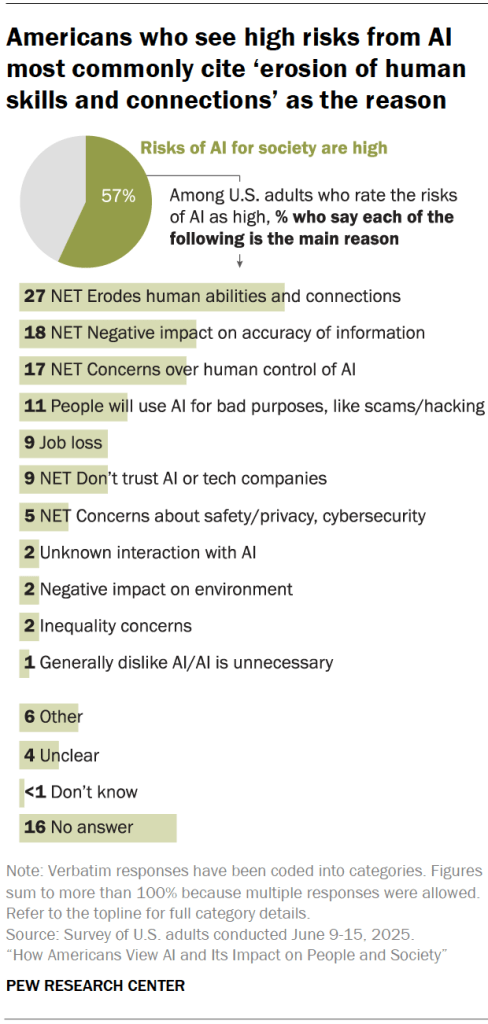☀️ Happy Thursday! The Briefing is your guide to the world of news and information. Sign up here!
In today’s email:
- Featured story: Bari Weiss named editor-in-chief at CBS News
- In other news: Chicago journalists sue Trump administration
- Looking ahead: AI video app Sora tops charts
- Chart of the week: What Americans see as the risks of AI
🔥 Featured story
Bari Weiss has been named editor-in-chief at CBS News, network owner Paramount Skydance announced this week. Weiss founded digital media startup The Free Press – acquired by Paramount for $150 million – after she left The New York Times in 2020. In her resignation letter to the Times, Weiss criticized a culture she said was not open to certain viewpoints.
Paramount Skydance CEO David Ellison called Weiss a “proven champion of independent, principled journalism” and said he wants CBS News to “be at the forefront of a much-needed transformation in how news is gathered, reported and delivered.” Weiss this week sent a note to staff outlining 10 principles that will guide her leadership at CBS News, emphasizing accuracy, fairness and nonpartisan journalism.
Most Americans have long said that news organizations tend to favor one side (rather than deal fairly with all sides) when presenting news on political and social issues, with 77% taking this view in a 2024 Pew Research Center survey. And while majorities of the public describe most journalists as intelligent (63%) and well-intentioned (58%), more than half also say most journalists are biased (58%), according to a 2025 Center survey. Republicans are more likely than Democrats to say that “biased” describes most journalists well (74% vs. 45%).
📌 In other news
- Chicago journalists sue the Trump administration, alleging “extreme brutality” from federal agents
- Pentagon officials relax some press restrictions but proceed with others despite criticism
- Pope Leo XIV expresses support for free press, urging journalists to stand strong and “never sell out” their authority
- Sen. Ted Cruz advocates for restrictions on government censorship of media
- Megyn Kelly to get her own SiriusXM channel as part of multi-year deal
- A closer look at how TikTok keeps its users on the app
- Are independent reporters the future of watchdog journalism?
- Rothschild family seeks to sell its share in The Economist
📅 Looking ahead
Sora, OpenAI’s new video-generation app, has risen to the No. 1 spot on Apple’s App Store since its release last week, despite only being available to those with an invitation code. But experts warn that the app, which generates realistic short-form videos using AI, could make it easier to spread false information. The app has already been used to create convincing – though entirely fabricated – videos of crimes, arrests, terror attacks and more.
Many Americans do not feel confident in their ability to distinguish AI-generated content from real content. According to a recent Center survey, most Americans (76%) say it’s extremely or very important to be able to tell if pictures, videos and text were made by AI or people. But just 12% of U.S. adults are extremely or very confident they can detect if something was made by AI, while 53% are not too or not at all confident.
📊 Chart of the week
This week’s chart comes from a recent Center report on how Americans view AI. We asked the 57% of Americans who rate the risks of AI for society as high or very high why they feel this way. In their open-ended responses, 18% said the main reason they feel this way is the negative impact AI could have on accurate information, such as making it harder to tell what is real and what is created by AI.
As one respondent in his 30s said: “Misinformation is already a huge problem and AI can create misinformation a lot faster than people can.”

👋 That’s all for this week.
The Briefing is compiled by Pew Research Center staff, including Naomi Forman-Katz, Jacob Liedke, Christopher St. Aubin, Luxuan Wang, Emily Tomasik, and Joanne Haner. It is edited by Michael Lipka and copy edited by Anna Jackson.
Do you like this newsletter? Email us at info@pewresearch.org or fill out this two-question survey to tell us what you think.